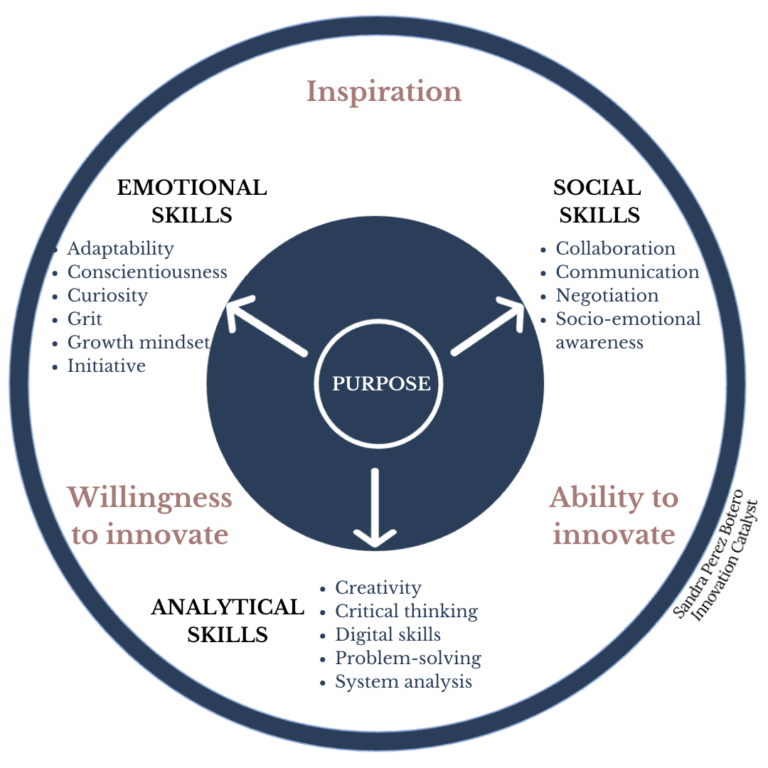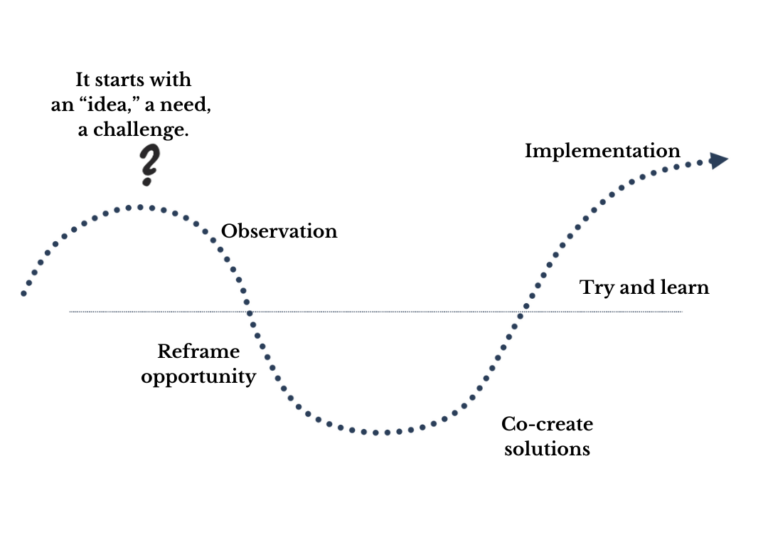Innovation Flashcards
Explore key concepts and ideas to build your innovation vocabulary.
The Innovation Flashcards provide a gateway to understanding the diverse language of innovation.
Similar to a language with many dialects, innovation vocabulary lacks singular definitions for its concepts. These flashcards offer perspectives to help you develop your own understanding. Explore them to build a foundation for effective collaboration.
SIX lessons from the corporate world that changed my view on innovation:
1. Co-creation trumps creativity
Creativity is an individual mental process. Co-creation is integral and collaborative; it invites us to use “analytical” intelligence as well as sensations, emotions, and intuition. What we create with others always has more impact.
2. To transform the world, you must transform yourself
Innovation is about transformation, evolution, and changing “what is” to “what could be.” Whoever cannot transform herself will hardly transform the world.
3. If it does not generate value, it's not Innovation
Discussing whether or not something is innovative is like debating “how many angels fit in the tip of a needle.” On the other hand, seeking value generation requires focusing on economic, emotional, and social outputs for people and organizations.
4. Ideas worth "nothing" if you don't make them real
The 1% of inspiration requires much work on opportunity identification.
The 99% of “hard work” to implement is always necessary. Continuously.
5. Innovation is leadership. Leadership is Innovation
This applies to individuals, teams, and organizations. Innovation requires vision and the courage to make challenging decisions. Those who do not change their inside do not change their outcomes.
6. Innovation to improve people's lives
Those who create products, services, and business models impact people’s lives. Let’s make sure the impact is always positive! Innovation is a way to do good! #goodtobedone.
The basics
What's innovation
Innovation is a multifaceted concept that resists a singular definition.
My Approach
Innovation is the process of solving meaningful problems and creating value for individuals, organizations, and society.
Explore how various experts define innovation in the downloadable guide.
Why is innovation important?
“We live in a world where the barriers to competition are coming down. Knowledge itself is becoming a commodity. In this environment, the only way you protect yourself is through innovation.” G. Hamel
Innovation is crucial for companies to stay relevant and competitive
It drives growth, enhances competitiveness, and meets evolving customer needs.
Do I need to invent something entirely new to be an innovator?
Not at all.
While groundbreaking inventions can capture headlines, true innovation is about creating value. Whether it’s improving existing solutions or solving pressing problems, innovation enhances lives and drives progress.
Is it possible to learn how to innovate?
Absolutely.
While many programs offer processes and methodologies, true innovation also demands personal growth. Cultivate habits like observing trends, seeking opportunities, and embracing creativity. Most importantly, be willing to challenge and break existing paradigms.
Are innovation and creativity the same?
No.
Creativity involves generating new and novel ideas, whereas innovation is about implementing those ideas into valuable solutions.
Is innovation exclusive of big corporations?
No at all!
Innovation flourishes in businesses of all sizes and even in personal life. Small and medium enterprises often drive innovation with agility and creativity. Everyone has the power to transform their reality by embracing innovative mindsets.
Can innovation be measured?
Yes, innovation metrics depend on your definition.
Companies often track new product launches, contribution to sales, and market share growth. Additionally, assessing economic, societal, and emotional value creation provides a comprehensive view of innovation’s true impact.
Why leadership is crucial for innovation?
An innovation leader doesn’t provide all the answers but creates an inspiring environment where people are empowered to tackle challenges creatively. They also ensure access to the resources needed to drive innovative solutions, fueling progress and success.
Can I innovate alone?
Innovation is a "team sport"
Even when pursuing personal innovation, seek feedback and build a strong support network to help identify blind spots and enhance your ideas.
What are innovation skills?
Innovation skills involve identifying opportunities, generating and implementing ideas, and collaborating effectively.
Depending on your focus, you may need to cultivate specific skills to enhance your expertise and drive successful innovation.
Explore the proposed model for innovation skills development below.
Skills and abilities for leading innovation
Inspired by WEF’s New Models of Leadership and WEF’s Taxonomy for the Future of Learning.

Share the Innovation Leadership Model
I'm also curious about...
Why innovation fails?
Innovation frequently fails due to a lack of market and customer understanding, poor execution, change resistance, and resource shortfalls.
Add unclear strategies, bad timing, and irrelevant benefits to the mix, and even the best ideas can falter.
How can I evaluate if there's an innovation opportunity?
5 basic criteria
2. Value
Is it a significant pain point for many, or for a few willing to pay a premium? Determine if addressing this need offers broad appeal or meets niche demands where there’s a high willingness to invest.
1. Importance
What are the consequences if the identified need isn’t addressed? Consider the potential impact on individuals, businesses, or society and whether it could lead to significant challenges or missed opportunities.
3. Current solutions
Do current solutions fall short or create additional problems? Analyze whether existing options adequately meet the need or if they leave gaps and pain points that an innovative solution could address more effectively.
4. Trend Aligment
Are you leveraging a trend, subtle changes, or emerging opportunities? Examine if aligning with these shifts can give you a competitive edge, positioning your innovation to meet future demands and preferences effectively.
5. Market Opportunity
Are you tapping into a measurable market opportunity, understanding jobs to be done (JTBD), not just existing categories? Analyze the potential financial value, ensuring that your innovation can generate revenue.
Let's explore the "how-tos"
Is innovation a process?
While many sources define innovation as a process, I see it as the result of one. Though the processes vary, they often feel like a roller coaster ride. See the image below for more insight.
Innovation Process: A non-linear roller coaster designed to reduce uncertainty.

What’s the best methodology for innovation?
There’s no single best tool.
Understand the core principles of various methods to combine them effectively. Focus on the principles, not just the methods. Download the toolkit for a summary of practices to enhance your innovation journey. By aligning these with key habits, you’ll accelerate your progress.

